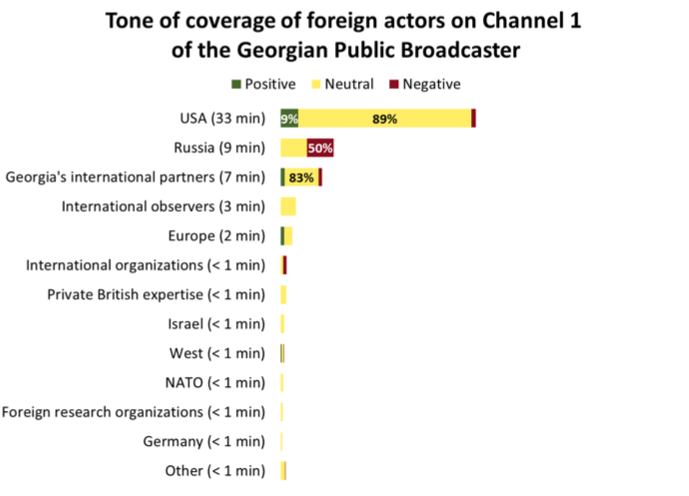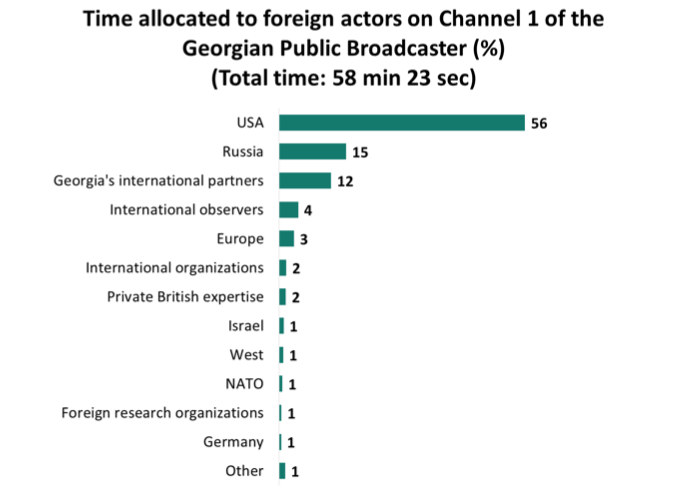
According to the EU/UNDP media monitoring project ‘Study and Research on Election Media Coverage for the 2020 Parliamentary Elections in Georgia,’ between August 28 and October 7, Georgian First Channel allocated 12 hours and 3 minutes to the election-related topics in the main evening news programs, of those, 11% were foreign actors.
As study claims, about a quarter of the news stories (25 out of 99) related to foreign actors appeared in the top 5 stories of the news program.
“Foreign actors-related topics include MEP’s messages and their assessments, voting in European Parliament, the European Parliament regulation on the implementation of the Association Agreement between Georgia and the EU, pandemics and elections, the arrival of international election observers, the US Secretary of State Mike Pompeo’s message on the importance of international observers arrival in Georgia, Georgian Prime Minister’s online address to the UN General Assembly, Giorgi Gakharia’s telephone conversation with the US Presidential Adviser, Cyber Security Forum, Code of Conduct for Political Parties, Parliamentary Elections 2020, opposition party visit to Brussels, Emerging Europe article on startups in Georgia,” noted the research.
In the context of Georgia’s parliamentary elections and pre-election processes, the study says that between August 28 and October 7, First Channel most frequently covered actors related to Europe and the European Union. The next most frequently covered actors were representatives of the United States as well as actors representing Russia and NATO. The rest of the subjects were given three minutes or less.

The share of the coverage was mostly indirect. However, the US Ambassador, MEPs, representatives of the EU Delegation to Georgia, international observers and NATO representatives were given the opportunity to speak directly.
As for the tone of coverage of the foreign actors,’ in case of Europe and the EU, one-fifth of the coverage was positive, the rest – neutral. The coverage was mostly positive regarding NATO, which is mainly related to the NATO Secretary General speech during the Prime Minister’s visit to Brussels. Russia has a negative share of coverage (92%),” the study noted.
The research mentioned that Russia and its related actors were mostly negatively covered in relation to Georgia.
“Election subjects openly expressed a negative attitude towards Russia in a bid to emphasize their own political party’s foreign policy orientation. In addition, respondents often were associating election subjects with Russia to discredit them,” reads the study.

While covering the Cyber Security Forum, the study noted that First Channel focused on the importance of this topic in the pre-election period and cyberattack threats by Russia. In various news stories, election subjects (both the ruling Georgian Dream and opposition parties) talked about Russia’s interference in the 2020 parliamentary elections and its cyber-attacks.
“In contrast to Russia, Western actors, representatives of the European Union and the United States, were mainly presented as authorities whose views should be given special importance. In the bulk of news stories, US Ambassador Kelly Degnan is portrayed in a positive light as a person interested in the ongoing processes in the country. The Ambassador consistently stressed the need for greater parliamentary representation and awareness of Georgian voters, as well as the need to adhere to the principles set out in the Code of Conduct for Parties, which will promote free, fair and transparent elections. Along with the US Ambassador, the German Ambassador and the EU Ambassador were covered during this reporting period. They tackled the problems of polarization of the pre-election environment and stressed that the violations observed during the pre-election period would affect the election process,” claims the study.
Media monitoring project said that the long-term and short-term observation missions announced by the OSCE / ODIHR in the 2020 parliamentary elections were covered as key role players in the democratic and transparent conduct of the election process.
“As for the messages of the MEPs regarding the European Parliament resolution, both the praise and criticism regarding Georgia, recommendations and support of the MEPs towards Georgia’s European aspirations were presented. First Channel covered both sides to some extent – the support that the government saw in the MEPs’ messages as well as the criticism that the opposition focused on – emphasizing the importance of an apolitical court and refraining from politically motivated cases against media owners. On top of that, First Channel aired an interview with MEP Marina Kaljurand, saying that the European Parliament resolution said exactly what they wanted to say and there was no need to search for additional messages between paragraphs,” stressed the study.
The tone of the news anchors and journalists when covering foreign actors was mostly neutral and represented a periphrasis of the respondents’ statements. Most of the stories kept the balance of sources, which allowed the viewer to get acquainted with different viewpoints on the covered issue. However, there were cases when the number of sources and the intensity of coverage left a feeling of imbalance, said the research.
The Georgian Charter of Journalistic Ethics, as part of the EU/UNDP ‘Survey of Media Coverage of Georgian Parliamentary Elections 2020’ project, is monitoring the coverage of Georgia’s 2020 parliamentary elections by TV media. The monitoring began on 15 June 2020 and will run until December 2020, focusing upon the 12 channels.
Together with @EUinGeorgia, we are monitoring 43 media outlets to find out how Georgian media is covering parliamentary elections 2020, what kind of electoral news gets the most social media outreach + how TVs see foreign influence on Georgian elections. https://t.co/WYEQIdlUEZ
— UNDP in Georgia (@UNDPGeorgia) October 29, 2020





